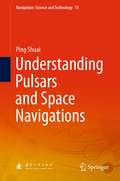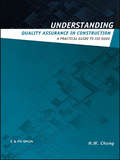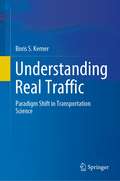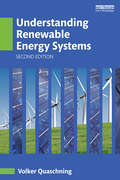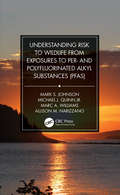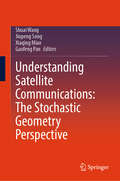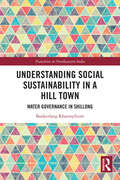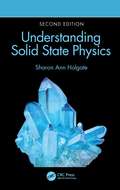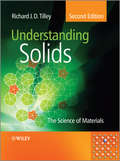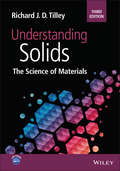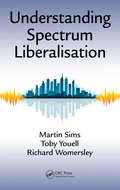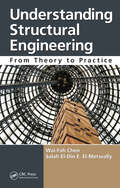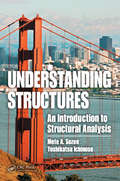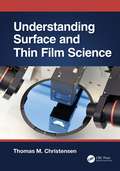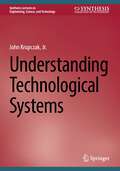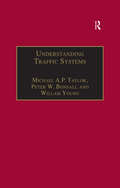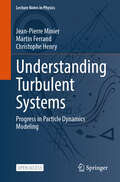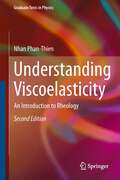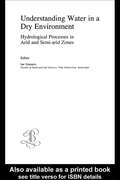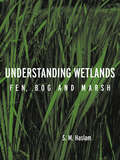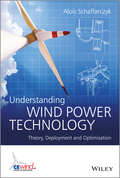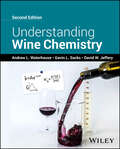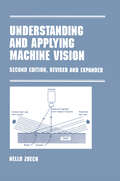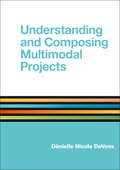- Table View
- List View
Understanding Pulsars and Space Navigations (Navigation: Science and Technology #11)
by Ping ShuaiThis book systematically presents the concept, history, implementation, theory system and basic methods of pulsar and space flight, illustrating the characteristics of pulsars. It also describes the classification of spacecraft navigation systems and the autonomous navigation technologies, as well as X-ray pulsar-based navigation systems (XPNAV) and discusses future navigation satellite systems in detail.
Understanding Quality Assurance in Construction: A Practical Guide to ISO 9000 for Contractors (Understanding Construction)
by H.W. ChungThe ISO 9000 family of quality standards has been adopted world-wide as a framework for building better relationships between suppliers and customers. Originally a manufacturing-industry concern, quality is now acknowledged to be a key issue for the construction sector whose clients increasingly demand quality certification. This book explains the concepts and practice of quality assurance and management in construction. Clearly written and well illustrated, with plenty of sample quality system documents and other pro-forma, this book will make the daunting task of developing, implementing and managing a quality system a great deal easier for contractors.This is practical guide for building and construction contractors and sub-contractors, project managers and other construction professionals. Also for undergraduate and postgraduate students of building, construction management and project management.
Understanding Real Traffic: Paradigm Shift in Transportation Science
by Boris S. KernerThis book addresses the reader interested in vehicular traffic phenomena, who have not learned about them before. It presents traffic phenomena like traffic breakdown and the emergence of moving traffic jams by showcasing empirical traffic data measured in real-world traffic. The author explains how these empirical traffic studies have led to the three-phase traffic theory and why this new theory is in conflict with standard traffic theories developed before. Moreover, he presents the reason for the failure of applications of standard traffic theories in real-world traffic and discusses why understanding real traffic has caused a paradigm shift in traffic and transportation science. The book examines why understanding real traffic breakdown is the basis for an explanation for the autonomous driving effects on traffic flow. It shows that understanding real traffic is possible from real-world traffic data without the need of mathematical traffic models. This makes the book intuitive for non-specialists, who can qualitatively understand all the basic features of traffic dynamics. In turn, experienced traffic researchers can grasp concepts and ideas made here easily accessible by the author, one of the leading pioneers in the field of vehicular traffic.
Understanding Renewable Energy Systems
by Volker QuaschningBy mid-century, renewable energy must cover all of our energy supply if we are to phase out nuclear and successfully stop climate change. Now updated and expanded, the 2nd edition of this textbook covers the full range of renewable energy systems and now also includes such current trends as solar power storage, power-to-gas technologies, and the technology paths needed for a successful and complete energy transition. The topics are treated in a holistic manner, bringing together maths, engineering, climate studies and economics, and enabling readers to gain a broad understanding of renewable energy technologies and their potential.Numerous examples are provided for calculations, and graphics help visualize the various technologies and mathematical methodologies. Understanding Renewable Energy Systems is an ideal companion for students of renewable energy at universities or technical colleges on courses such as renewable energy, electrical engineering, engineering technology, physics, process engineering, building engineering, environment, applied mechanics and mechanical engineering, as well as scientists and engineers in research and industry.
Understanding Risk to Wildlife from Exposures to Per- and Polyfluorinated Alkyl Substances (PFAS)
by Mark S. Johnson Michael J. Quinn Jr. Marc A. Williams Allison M. NarizzanoUnderstanding Risk to Wildlife from Exposures to Per- and Polyfluorinated Alkyl Substances (PFAS) provides the most recent summary of toxicity data relevant to mammals, birds, reptiles, and amphibians, and provides values for use in risk assessment applications. Predicting the bioaccumulation of PFAS in terrestrial wildlife (including humans) has proven to be extremely complex. As a group, PFAS act differently than traditional non-ionic organic molecules, where PFAS can break down and reform, whereas some are demonstrated to be extremely persistent. Where sufficient data are provided, this book establishes toxicity reference values (TRVs), which are derived to assist in characterizing environmental sources of contamination and making risk-based decisions. Features: Provides toxicity reference values (TRVs) for vertebrates (mammals, birds, amphibians) for PFAS, where sufficient data are available, and includes objective supporting background information. Assigns a level of confidence to each TRV to provide the risk assessor with an understanding of the relative uncertainty associated with each value. Presents toxicity data in the formats of scatter diagrams and tables for quick review and assessment. Provides TRVs relevant for screening and decision making This book serves as a useful aid for risk assessors and managers in those industries that have sites contaminated with PFAS, consultants tasked with evaluating risks at such sites, and staff at regulatory agencies at various governmental levels, who need to know how much contamination is considered safe for wildlife. It will also appeal to researchers with an interest in filling the gaps in the current toxicological data for PFAS exposure.
Understanding Satellite Communications: The Stochastic Geometry Perspective
by Shuai Wang Gaofeng Pan Xiaqing Miao Jinpeng SongThis book aims to analyze and model satellite communication systems while taking into account the variable transmission performance that occurs due to randomness in space, aerial, and terrestrial terminals. The book covers both conceptual principles and practical engineering applications, with an emphasis on the latter. Readers will gain a deep understanding of several major topics, including satellite-terrestrial communications, satellite-aerial communications, satellite-aerial-terrestrial communications, and terrestrial-satellite-terrestrial communications. A key feature of this book is its comprehensive and systematic treatment of satellite communication issues, making it an ideal resource for anyone interested in learning about various application scenarios in this field. Researchers, engineers, and graduate students in wireless communications, signal processing, and related areas will find this book highly valuable.
Understanding Social Sustainability in a Hill Town: Water Governance in Shillong (Transition in Northeastern India)
by Bankerlang KharmylliemNestled amidst rolling hills, Shillong, the Himalayan capital city of Meghalaya in India’s northeast, faces a growing challenge of water scarcity. This timely book examines the role of urban and traditional village councils (the Khasi dorbar shnong) in shaping equitable water distribution and management through the lens of social sustainability. The book navigates through the complexities of water governance, shedding light on the challenges and opportunities and elucidating the interplay between tradition and modernity in urban governance. It also features narratives of success and struggle, and covers diverse themes, including social capital and gender. It initially foregrounds social sustainability setting the context for the study. It ventures into a detailed examination of the institutions of the village councils, with particular attention to water equity and water governance, including highlighting differences between municipal and non-municipal areas. The volume offers significant theoretical and empirical insights into Shillong's water challenges, filling a gap in the literature on northeast hill towns/cities.Part of Transitions in Northeastern India series, this book will be valuable to a diverse audience including students, researchers, policy practitioners, community leaders, and general readers interested in urban studies, sociology, development studies, public administration, Asian studies, sustainability, and those concerned about our urban-water future.
Understanding Solid State Physics
by Sharon Ann HolgateKeeping the mathematics to a minimum yet losing none of the required rigor, Understanding Solid State Physics, Second Edition clearly explains basic physics principles to provide a firm grounding in the subject. This new edition has been fully updated throughout, with recent developments and literature in the field, including graphene and the use of quasicrystalline materials, in addition to featuring new journalistic boxes and the reciprocal lattice. The author underscores the technological applications of the physics discussed and emphasizes the multidisciplinary nature of scientific research. After introducing students to solid state physics, the text examines the various ways in which atoms bond together to form crystalline and amorphous solids. It also describes the measurement of mechanical properties and the means by which the mechanical properties of solids can be altered or supplemented for particular applications. The author discusses how electromagnetic radiation interacts with the periodic array of atoms that make up a crystal and how solids react to heat on both atomic and macroscopic scales. She then focuses on conductors, insulators, semiconductors, and superconductors, including some basic semiconductor devices. The final chapter addresses the magnetic properties of solids as well as applications of magnets and magnetism. This accessible textbook provides a useful introduction to solid state physics for undergraduates who feel daunted by a highly mathematical approach. By relating the theories and concepts to practical applications, it shows how physics is used in the real world. Key features: Fully updated throughout, with new journalistic boxes and recent applications Uses an accessible writing style and format, offering journalistic accounts of interesting research, worked examples, self-test questions, and a helpful glossary of frequently used terms Highlights various technological applications of physics, from locomotive lights to medical scanners to USB flash drives
Understanding Solids
by Richard J. TilleyThe second edition of a modern introduction to the chemistry and physics of solids. This textbook takes a unique integrated approach designed to appeal to both science and engineering students.Review of 1st edition"an extremely wide-ranging, useful book that is accessible to anyone with a firm grasp of high school science...this is an outstanding and affordable resource for the lifelong learner or current student." Choice, 2005The book provides an introduction to the chemistry and physics of solids that acts as a foundation to courses in materials science, engineering, chemistry, and physics. It is equally accessible to both engineers and scientists, through its more scientific approach, whilst still covering the material essential to engineers.This edition contains new sections on the use of computing methods to solve materials problems and has been thoroughly updated to include the many developments and advances made in the past 10 years, e.g. batteries, solar cells, lighting technology, lasers, graphene and graphene electronics, carbon nanotubes, and the Fukashima nuclear disaster.The book is carefully structured into self-contained bite-sized chapters to enhance student understanding and questions have been designed to reinforce the concepts presented.The supplementary website includes Powerpoint slides and a host of additional problems and solutions.
Understanding Solids: The Science of Materials
by Richard J. TilleyExplore a comprehensive and illuminating introductory text to the science of solid materials from a leading voice in the field The newly revised Third Edition of Understanding Solids: The Science of Materials delivers a complete yet concise treatment of the basic properties and chemical and physical behaviors of solid materials. Following a completely revised opening set of chapters in which the basic properties of solids—including atomic structure, chemical bonding, crystallography, and phase relationships—are discussed, the book goes on to describe new developments in the areas of batteries and fuel cells, perovskite solar cells, lighting and displays, nanoparticles, whiskers, and sheets. The distinguished author has also added sections about organic framework structures, superionic conductors, mechanochemistry, bi-layer graphene, hologram formation and recording, and the optics of nanoparticle arrays and thermochromic materials. Each chapter includes a Further Reading section to help students accumulate additional knowledge on the topic within and new problems have been added throughout the book. Readers will also enjoy the inclusion of: A thorough introduction to the states of aggregation, including atoms and bonding, microstructures and phase relationships, and crystal structures and defects A comprehensive overview of different categories of solids, including metals, crystalline silicates, inorganic ceramics, and silicate glasses An exploration of reactions and transformations, including diffusion and ionic conductivity, phase transformations, and phase reactions A treatment of oxidation and reduction, including galvanic cells and chemical analysis Perfect for undergraduate students in sciences, engineering, and technology, Understanding Solids: The Science of Materials will also earn a place in the libraries of anyone seeking a thoroughly up to date, one-stop reference to the science of solid materials.
Understanding Spectrum Liberalisation
by Martin Sims Toby Youell Richard WomersleyUntil the 1990s, almost all spectrum licenses were given away practically for free-even the first mobile licenses which laid the foundation for multi-billion dollar companies that dominate stock markets around the world. In the past fifteen years, there has been a concerted attempt to liberalise the sector and make it more open to market forces. Th
Understanding Structural Engineering: From Theory to Practice
by Wai-Fah Chen Salah El-Din El-MetwallyIn our world of seemingly unlimited computing, numerous analytical approaches to the estimation of stress, strain, and displacement-including analytical, numerical, physical, and analog techniques-have greatly advanced the practice of engineering. Combining theory and experimentation, computer simulation has emerged as a third path for engineering
Understanding Structures: An Introduction to Structural Analysis
by Mete A. Sozen Toshikatsu IchinoseBefore structural mechanics became the common language of structural engineers, buildings were built based on observed behavior, with every new solution incurring high levels of risk. Today, the pendulum has swung in the other direction. The web of structural mechanics is so finely woven that it hides the role of experience in design, again leading to high levels of risk.Understanding Structures brings the art and science of structures into the environment of a computer game. The book imparts a basic understanding of how buildings and bridges resist gravity, wind, and earthquake loads. Its interactive presentation of topics spans elementary concepts of force in trusses to bending of beams and the response of multistory, multi-bay frames. Formulate Graphical and Quantitative Solutions with GOYA The companion software, GOYA, runs easily on any java-enabled system. This interactive learning environment allows engineers to obtain quick and instructive graphical and quantitative solutions to many problems in structures. Simulation is critical to the design and construction of safe structures. Using GOYA and the tools within Understanding Structures, engineers can enhance their overall understanding of structure response as well as expedite the process of safe structure design.
Understanding Surface and Thin Film Science
by Thomas M. ChristensenThis book is a conceptual overview of surface and thin film science, providing a basic and straightforward understanding of the most common ideas and methods used in these fields. Fundamental scientific ideas, deposition methods and characterization methods are all examined. Relying on simple, conceptual models and figures, fundamental scientific ideas are introduced and then applied to surfaces and thin films in the first half of the book. Topics include vacuum and plasma environments, crystal structure, atomic motion, thermodynamics, electrical and magnetic properties, optical and thermal properties, and adsorbed atoms on surfaces. Common methods of gas phase thin film deposition are then introduced, starting with an overview of the film growth process and then a discussion of both physical and chemical vapor deposition methods. This is followed by an overview of a wide range of characterization techniques including imaging, structural, chemical, electrical, magnetic, optical, thermal, and mechanical techniques. Thin film science is a natural extension of surface science, especially as applications involve thinner and thinner films; distinct from other literature in the field, this book combines the two topics in a single volume. Simple, conceptual models and figures are used, supported by some mathematical expressions, to convey key ideas to students as well as practicing engineers, scientists, and technicians.
Understanding Technological Systems (Synthesis Lectures on Engineering, Science, and Technology)
by John Krupczak, Jr.This book is about understanding technology using the perspective of systems. It addresses the need for an accessible approach to understanding the broad range of technological devices and systems that create the modern world. Understanding technological systems offers an introduction to engineering and technology centered on the underlying structure common to all technological objects. This framework views technological systems as created using components to provide specific capabilities or functions. Components contributing well-defined functions interact with other components to create systems. Major topics include the concepts of technological function and the embedding of functional capabilities in physical components, the hierarchical nature of systems, and the clustering of related systems into technological domains. The book fills the gap between engineering science and engineering design.
Understanding Traffic Systems: Data Analysis and Presentation
by Michael A.P. Taylor Peter W. BonsallRoad traffic and its impacts affect all aspects of modern life, leisure and industry, with safety, congestion and pollution being of greatest public concern. Transport planning increasingly emphasises travel demand management (TDM) and traffic calming - aided by dynamic, lower cost data from Intelligent Transport Systems (ITS) - to enable real time monitoring, control and traveller information. This second edition of a highly successful work has been fully updated since its first publication in 1996 to reflect developments in technology available to the traffic analyst and in the social, ecological and economic environment. New sections are included on shockwaves, data capture without surveys, traffic incidents, delay estimation, off-line use of on-line data, environmental sensitivity, and controlled crash tests. The authors introduce and demonstrate techniques with which the analyst, engineer or planner can examine traffic problems. The underlying theme is that proper understanding of traffic systems performance and traffic problems can only come from the intelligent processing, refinement, appraisal and evaluation of traffic data. Arranged in five parts, the book offers an integrated approach to tackling road traffic problems: ¢ How to gain information and understanding about traffic ¢ The theories of traffic flow ¢ The principles of good survey planning and management ¢ Specific types of traffic studies ¢ Analytical techniques for transforming raw data into useful information. Understanding Traffic Systems provides cogent insights into the techniques of traffic data collection and analysis, the application of traffic theory and the role of data in analysis and decision making. Its breadth and use of examples from several countries make it a useful reference text for students and researchers, as well as an essential tool for practising traffic engineers and planners.
Understanding Turbulent Systems: Progress in Particle Dynamics Modeling (Lecture Notes in Physics #1039)
by Jean-Pierre Minier Christophe Henry Martin FerrandThis open access book provides a thorough introduction to modeling turbulent, dispersed, two-phase flows. It explains the physical phenomena and governing laws at play, followed by a clear and systematic overview of the statistical tools used to develop simplified or coarse-grained models. With a pedagogical approach, the book uses practical examples to explain complex physical processes and stochastic methods, making it accessible to readers familiar with basic courses in statistical physics and applied mathematics. It also highlights emerging research areas and unexplored challenges in the field. Designed as a self-contained resource, this book is ideal for graduate students and junior researchers in various branches of physics. At the same time, it serves as a valuable reference for experts seeking deeper insights into turbulent, dispersed, two-phase flows.
Understanding Viscoelasticity: An Introduction to Rheology
by Nhan Phan-ThienThis book presents an introduction to viscoelasticity; in particular, to the theories of dilute polymer solutions and dilute suspensions of rigid particles in viscous and incompressible fluids. These theories are important, not just because they apply to practical problems of industrial interest, but because they form a solid theoretical base upon which mathematical techniques can be built, from which more complex theories can be constructed, to better mimic material behaviour. The emphasis is not on the voluminous current topical research, but on the necessary tools to understand viscoelasticity at a first year graduate level. The main aim is to provide a still compact book, sufficient at the level of first year graduate course for those who wish to understand viscoelasticity and to embark in modeling of viscoelastic multiphase fluids. To this end, a new chapter on Dissipative Particle Dynamics (DPD) was introduced which is relevant to model complex-structured fluids. All the basic ideas in DPD are reviewed, with some sample problems to illustrate the methodology.
Understanding Water in a Dry Environment: IAH International Contributions to Hydrogeology 23 (IAH - International Contributions to Hydrogeology)
by Ian SimmersIn order to provide water security in the twenty-first century, there is universal agreement that a continuation of current policies and extrapolation of trends is not an option. Also clear is that from both water supply and development perspectives, the world's arid and semi-arid regions are those currently and potentially experiencing the highest
Understanding Wetlands: Fen, Bog and Marsh
by S. M. HaslamWetlands are an important, and sadly diminishing, habitat in many parts of the world. They contribute significantly to the planet's biodiversity, housing thousands of species of plants and animals. Increasingly, human management is required to sustain, and even create these fragile ecosystems, while global changes in climate are also taking their t
Understanding Wind Power Technology
by Alois SchaffarczykWind energy technology has progressed enormously over the last decade. In coming years it will continue to develop in terms of power ratings, performance and installed capacity of large wind turbines worldwide, with exciting developments in offshore installations.Designed to meet the training needs of wind engineers, this introductory text puts wind energy in context, from the natural resource to the assessment of cost effectiveness and bridges the gap between theory and practice. The thorough coverage spans the scientific basics, practical implementations and the modern state of technology used in onshore and offshore wind farms for electricity generation.Key features: provides in-depth treatment of all systems associated with wind energy, including the aerodynamic and structural aspects of blade design, the flow of energy and loads through the wind turbine, the electrical components and power electronics including control systems explains the importance of wind resource assessment techniques, site evaluation and ecology with a focus of project planning and operation describes the integration of wind farms into the electric grid and includes a whole chapter dedicated to offshore wind farms includes questions in each chapter for readers to test their knowledgeWritten by experts with deep experience in research, teaching and industry, this text conveys the importance of wind energy in the international energy-policy debate, and offers clear insight into the subject for postgraduates and final year undergraduate students studying all aspects of wind engineering. Understanding Wind Power Systems is also an authoritative resource for engineers designing and developing wind energy systems, energy policy makers, environmentalists, and economists in the renewable energy sector.
Understanding Wine Chemistry (Sci (society Of Chemical Industry) Ser.)
by David W. Jeffery Andrew L. Waterhouse Gavin L. SacksUnderstanding Wine Chemistry Understand the reactions behind the world’s most alluring beverages The immense variety of wines on the market is the product of multiple chemical processes – whether acting on components arising in the vineyard, during fermentation, or throughout storage. Winemaking decisions alter the chemistry of finished wines, affecting the flavor, color, stability, and other aspects of the final product. Knowledge of these chemical and biochemical processes is integral to the art and science of winemaking. Understanding Wine Chemistry has served as the definitive introduction to the chemical components of wine, their properties, and their reaction mechanisms. It equips the knowledgeable reader to interpret and predict the outcomes of physicochemical reactions involved with winemaking processes. Now updated to reflect recent research findings, most notably in relation to wine redox chemistry, along with new Special Topics chapters on emerging areas, it continues to set the standard in the subject. Readers of the second edition of Understanding Wine Chemistry will also find: Case studies throughout showing chemistry at work in creating different wine styles and avoiding common adverse chemical and sensory outcomes Detailed treatment of novel subjects like non-alcoholic wines, non-glass alternatives to wine packaging, synthetic wines, and more An authorial team with decades of combined experience in wine chemistry research and education Understanding Wine Chemistry is ideal for college and university students, winemakers at any stage in their practice, professionals in related fields such as suppliers or sommeliers, and chemists with an interest in wine.
Understanding and Applying Machine Vision, Revised and Expanded
by Nello ZeuchA discussion of applications of machine vision technology in the semiconductor, electronic, automotive, wood, food, pharmaceutical, printing, and container industries. It describes systems that enable projects to move forward swiftly and efficiently, and focuses on the nuances of the engineering and system integration of machine vision technology.
Understanding and Avoiding the Oil Curse in Resource-rich Arab Economies
by Ibrahim Elbadawi Hoda Selim Elbadawi Ibrahim Selim HodaFor over eighty years the Arab region has derived massive wealth from its natural resources, yet the region's economies remain little diversified, while the oil market is experiencing major structural shifts with the advent of shale gas. Moreover, the resource itself is eventually exhaustible. Under these conditions economic prosperity cannot be sustainable. The critical question is how can the countries of this region escape the 'oil curse'? In this volume, leading economists argue that the curse is not a predestined outcome but a result of weak institutions and bad governance. A variety of analytical perspectives and examination of various international case studies leads to the conclusion that natural resources can only spur economic development when combined with sound political institutions and effective economic governance. This volume, with its unique focus on the Arab region, will be an important reference for researchers and policy makers alike.
Understanding and Composing Multimodal Projects: A Hacker Handbooks Supplement
by Dànielle Nicole DevossUnderstanding and Composing Multimodal Projects is designed for students who are analyzing or creating Web sites, video essays, public service ads, collages, and other texts that combine words, sound, and images. Stocked with examples that instruct and activities that foster practice, this brief book prepares students to view multimodal texts critically, write analytically about them, and plan and create their own--with attention to project management, copyright, and delivery.
